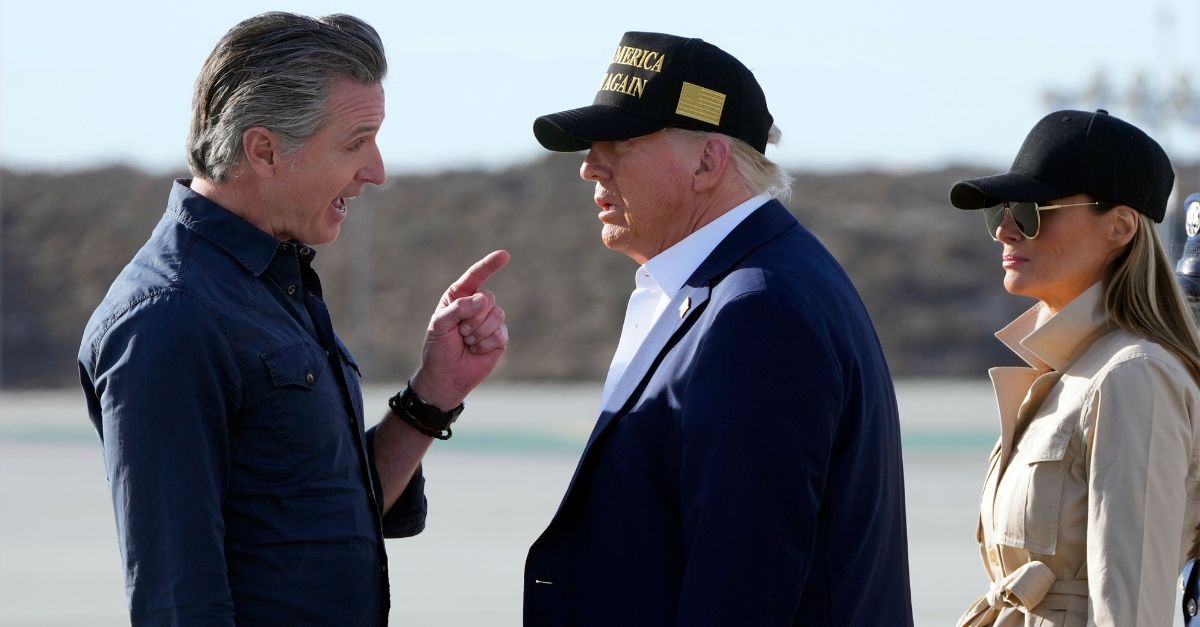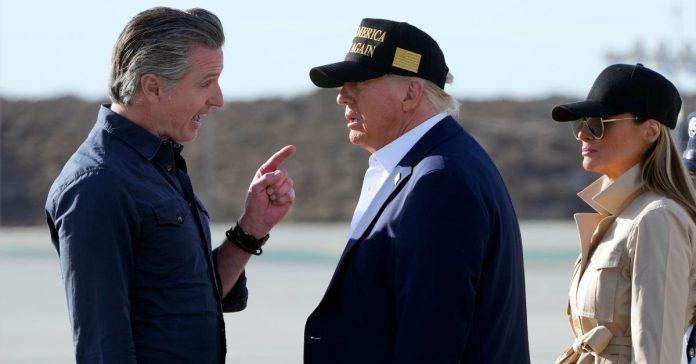
FILE – President Donald Trump and first lady Melania Trump listen to California Gov. Gavin Newsom after arriving on Air Force One at Los Angeles International Airport in Los Angeles, Jan. 24, 2025. (AP Photo/Mark Schiefelbein, File).
While rejecting the DOJ”s argument that a president can call up militia and never be second-guessed by the courts, the 9th U.S. Circuit Court of Appeals on Thursday nonetheless granted the Trump administration an emergency stay pending appeal, concluding it was “likely” at this stage that President Donald Trump “lawfully” deployed California’s National Guard to “protect federal personnel performing federal functions and to protect federal property” amid civil unrest and protests of ICE raids.
In the per curiam decision, U.S. Circuit Judges Mark Bennett and Eric Miller, both Trump appointees, and Jennifer Sung, a Joe Biden appointee, sided against Gov. Gavin Newsom, a Democrat, and disagreed with U.S. District Judge Charles Breyer’s analysis that the state was likely to succeed on claims the president exceeded his statutory authority and violated the 10th Amendment.
Writing that the Trump administration made a “strong showing that they are likely to succeed on the merits of their appeal,” the 9th Circuit stayed Breyer’s temporary restraining order on an emergency basis.
“Notably, Plaintiffs conceded that National Guard members, if validly federalized, may be deployed to protect federal personnel and property,” the court said. “The district court determined that Plaintiffs presented no evidence at the TRO hearing that National Guard members were engaged in any other activities, and Plaintiffs do not contest that determination.”
The panel did not, however, embrace the Trump administration’s argument that judicial review would not be available if a president invoked 10 U.S. Code § 12406 — the federal statute that allows the president to call up the National Guard — and federalized the National Guard from all 50 states and Washington, D.C., simultaneously. Still, the appellate court said it “must be highly deferential” in this area.
“We disagree with Defendants’ primary argument that the President’s decision to federalize members of the California National Guard under 10 U.S.C. § 12406 is completely insulated from judicial review,” the order said. “Nonetheless, we are persuaded that, under longstanding precedent interpreting the statutory predecessor to § 12406, our review of that decision must be highly deferential.”
“Affording the President that deference, we conclude that it is likely that the President lawfully exercised his statutory authority under § 12406(3), which authorizes federalization of the National Guard when ‘the President is unable with the regular forces to execute the laws of the United States,'” the court continued.
Later on, the panel made its position on judicial review even clearer.
“The source of the President’s power to federalize the National Guard is statutory, not constitutional. Consequently, the political question doctrine does not bar judicial review,” the order stated, rejecting the notion that a president could “federalize the National Guard based on no evidence whatsoever, and that courts would be unable to review a decision that was obviously absurd or made in bad faith.”
While the state of California had argued that Trump did not issue his order “through” Newsom, making the order procedurally invalid under the statute, the 9th Circuit found instead that Secretary of Defense Pete Hegseth’s “transmittal of the order to the Adjutant General of the California National Guard […] likely satisfied the statute’s procedural requirement[.]”
And if there was no statutory violation in this case, there was no 10th Amendment violation, the court added.
During Tuesday’s hearing, California attempted to make the case that Trump’s order was an affront to state sovereignty, democratic traditions, and the right to protest under the First Amendment. What’s more, said the state, there were identifiable harms — such as a risk of escalation of violence in the streets or a risk that wildfire prevention efforts would be hindered by Trump’s commandeering of the National Guard.
The 9th Circuit said those concerns are “too speculative” at this time.
“We do not know whether future protests will grow due to the deployment of the National Guard. And we do not know what emergencies may occur in California while the National Guard is deployed,” the court concluded. “Accordingly, at this time and on these facts, the remaining stay factors weigh in favor of Defendants.”

